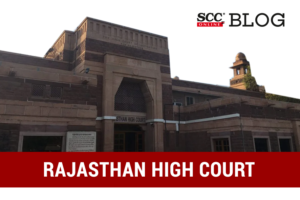Rajasthan High Court: Exercising the power under the writ jurisdiction, while dismissing the petition due to want of valid grounds, the single judge bench of Anoop Kumar Dhand J., held that resignation once accepted cannot be allowed to be withdrawn since the said act amounts to relinquishment of one’s own right in relation to an office.
In the matter at hand, the petitioner sought voluntary retirement on 01-08-2008 under the provision of Regulation 18 (3) of the RSEB Employees Service Regulations (1963 Regulations) but the said application was rejected by the respondent on account of shortage of manpower. A second application for seeking voluntary retirement was made on 10-12-2008. However, no order was passed on the said application despite sending reminders.
The petitioner subsequently tendered his resignation on 13-04-2009 wherein the respondent accepted the resignation with effect from 16-05-2009 in terms of regulation 16 of the Regulation, 1964. However, the petitioner submitted an application dated 25-05-2009 stating that he had made a mistake and accordingly should be reinstated back in service. The respondents did not agree with the submissions of the petitioner requesting for reinstatement back in service due to which the present petition was filed.
Issue for consideration
-
Whether the petitioner can withdraw his resignation after its acceptance?
-
Whether he can be allowed to say that his resignation be treated as voluntary retirement?
-
Whether he can be allowed to get service and pensionary benefits as if he remained in service for more than 33 years.
Analysis
The Court while relying upon BSES Yamuna Power Ltd. v. Ghanshyam Chand Sharma, (2020) 3 SCC 346 stated that denial of voluntary retirement does not mitigate the legal consequences that flow from resignation, therefore, the denial of voluntary retirement cannot be allowed to be invoked before this court to claim pensionary benefits when the petitioner had admittedly resigned.
The Court opined that even if the petitioner had served for more than 33 years, his services stood forfeited under Regulation 16 of the Regulations 1964 upon his resignation. The petitioner was, therefore, not entitled for pensionary benefits.
The Court stated that an employee can withdraw his resignation at any stage before the same becomes effective as he has locus poenitentiae to withdraw the resignation later as the jural relationship between the parties continues till the actual date of resignation.
The Court pointed to the fact that the petitioner had tendered his resignation and the same was even accepted, which estopped the petitioner by his own action.
The Court perused the resignation letter which indicated that the petitioner had submitted the same voluntarily in the usual course which was accepted by the respondent. It was only after the acceptance of his resignation, the petitioner sought re-employment by way of the present petition with the directions to the respondent to treat his resignation as an application for voluntary retirement and grant him service and consequential benefits.
The Court held that the relief sought could not be granted to the petitioner after acceptance of his resignation because the act of the petitioner amounts to relinquishment.
Explaining the meaning of the word ‘resignation’, the Court said that it’s an act of relinquishment of one’s own right in relation to an office. The resignation letter by the petitioner was unconditional and with an intent to operate as such.
“A “resignation” of a Public Office, when made with an intention of relinquishing the office, accompanied by an act relinquishment, then nothing further is required. Resignation once accepted, cannot be allowed to be withdrawn.” Observed the High Court
With the above observations, the Court held that the petition was devoid of merit and accordingly dismissed it.
[Narayan Shankar Upadhyaya v Rajasthan Rajya Vidhyut Prasaran Nigam Limited, 2023 SCC OnLine Raj 374, decided on 23-02-2023]
Advocates who appeared in this case:
For the petitioner- Advocate Sandeep Singh Shekhawat;
For the respondent- Advocate Dheeraj Palia and Advocate Akshay Sharma.

